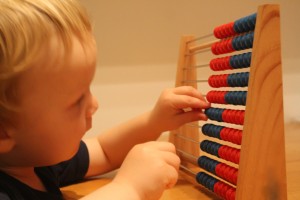The doctoral  thesis by Riikka Mononen investigates the effectiveness of early mathematics interventions for young children with low performance in mathematics. Previous research has indicated that early mathematics skills are a strong predictor of later mathematics performance. The goal of early mathematics interventions is to improve mathematics performance and to diminish the possibility of mathematics learning disability emerging later on.
thesis by Riikka Mononen investigates the effectiveness of early mathematics interventions for young children with low performance in mathematics. Previous research has indicated that early mathematics skills are a strong predictor of later mathematics performance. The goal of early mathematics interventions is to improve mathematics performance and to diminish the possibility of mathematics learning disability emerging later on.
This thesis reviewed early mathematics interventions and investigated the effectiveness of two early mathematics intervention programmes.
Study I reviewed mathematics interventions aimed at 4–7-year-old children with low performance in mathematics. For each intervention, effect sizes were calculated for mathematics outcome measures, and the pedagogical implementation was described. According to the results, in the majority of the interventions, the mathematics skills of the participating children improved more than the skills of the children in control groups, with effect sizes varying from small to large. Progress in mathematics learning was evident when instruction included one or more of the following instructional features: explicit instruction, peer-assisted instruction, applying a concrete-representational-abstract sequence, computer assisted instruction, or games.
The effectiveness of the RightStart Mathematics (RS) (Cotter, 2001) instruction was investigated in Studies II and III. In Study II, the instruction was provided for Finnish kindergartners in general education classrooms, with focus on low-performing children. Study II showed that the RS instruction was as effective as the typical Finnish kindergarten mathematics instruction. The counting skills of the initially low-performing children improved to the level of their typically performing peers. Follow-up in the first grade revealed performance differences between the initially low- and typically performing children, highlighting the importance of continuously monitoring progress, and providing intensified support.
In Study III, the RS instruction was provided in special education classrooms for children with a specific language impairment. Children with a SLI receiving RS instruction improved their counting skills to the level of their peers. In the first grade follow-up, the children with SLI performed similarly to their peers in addition and subtraction skills (accuracy) and multi-digit number comparison.
In Study IV, a mathematics intervention programme Improving Mathematics Skills in the Second Grade (IMS-2) (Mononen & Aunio, 2012) was developed, and its effectiveness for second graders performing low in mathematics was examined. The mathematics skills of the second graders participating in the IMS-2 intervention did not improve more than the skills of the children in control groups. However, the study provided valuable information about the functionality of the IMS-2 programme’s intensity and content.
The results indicate that rather than waiting for children to fail, mathematics interventions can be used successfully to promote the early mathematics skills of children with low performance in mathematics, already before the onset of formal schooling and in the early grades. Therefore, identifying low performance in mathematics and providing sufficient support should be emphasised already in early childhood education, in accordance with the Finnish three-tiered educational support system.
Riikka Mononen, M.Ed., will defend the doctoral dissertation entitled “Early mathematics interventions – Supporting young children with low performance in mathematics” in the Faculty of Behavioural Sciences, University of Helsinki, on 17 December 2014 at 12:00. The public examination will take place at the following address: Athena, lecture hall 302, Siltavuorenpenger 3 A. Professor Annemie Desoete, University of Ghent, Belgium, will serve as the opponent, and Professor Pirjo Aunio as the custos.
The dissertation is also available in electronic form through the E-thesis service: http://urn.fi/URN:ISBN:978-951-51-0190-7
Contact information:
Riikka Mononen
riikka.m.mononen@helsinki.fi

